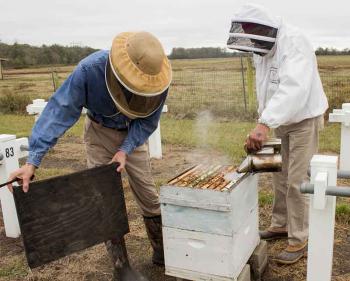
Research leader Bob Danka and Victor Rainey, who is involved with mite-resistance research, collect bee samples USDA Honey Bee Breeding, Genetics and Physiology Laboratory.
Lab in Louisiana studies problems in bee colonies
In recent years, considerable buzz has focused on the health of one small insect — the honey bee.
In spite various reasons for their decline in numbers, says Robert Danka, research leader at the USDA Honey Bee Breeding, Genetics and Physiology Laboratory in Baton Rouge, one thing is certain: Whatever the cause or causes of short-term annual honey bee colony loss, there is a looming problem for beekeepers.
Danka said beekeepers in the past have lost roughly 10 to 15 percent of their colonies annually, a loss that was sustainable. Currently, they are losing twice that number of colonies.
“[Beekeepers] are working hard to keep the numbers up ...,” Danka said. “Some bee colonies die every year. Ten percent is one thing, but 30 to 40 percent is something different.”
Danka says that even with the decline, which first became an issue 10 years ago, there has not been a decrease in production – as yet.
Several causes, or stressors, threaten honey bee health, according to Danka. These include pests, parasites, pathogens, pesticides, habitat loss and overworked bees.
In the Baton Rouge area, he noted, the expanse of student housing has contributed to the bees’ habitat loss.
For example, the land that’s now dedicated to apartment complexes the Woodlands of Baton Rouge and The Cottages of Baton Rouge are areas that used to house bees.
Danka said honey bees have faced a variety of pests throughout the years, but the Varroa mite, which is from the far east sectors of Asia, is the greatest threat to colonies of European honey bees, except in Australia.
Many bees used for beekeeping worldwide, including in the United States, originally are from Europe.
The mite, which only lives for a few days if not on a honey bee, reproduces on an immature bee, he said.
While the federal bee facility engages in a range of tasks, Danka said that for the last two decades the center has been identifying characteristics of mite-resistant bees and breeding resistant bees.
However, Danka and Kristen Healy, an assistant professor who specializes in medical entomology and public health entomology at Louisiana State University, believe Louisiana has fared relatively well in terms of honey bee decline.
Healy listed temperature as another stressor, noting honey bees typically don’t do well in cooler climates. Louisiana’s warmer year-round climate is more suitable to them.
Like Danka, Healy said it’s likely multiple factors contribute to decline instead of one root cause.
“Think about how a human deals with stress,” Healy said. “You pile so many stressors onto an individual that it compounds the effects of each one of those stresses.”
Healy and others at the university are studying pesticide effect on bees. When it comes to pesticides, she said, the primary risk factors are toxicity and exposure.
While some pesticides are worse than others, the goal is the release of pesticides at night when bees are back in their hives.
“Generally, beekeepers have pretty close contact with their bees,” Healy said. “With pesticides], it tends to be more acute mortality so you (suddenly) will see a lot of dead bees in front of a hive.”
Chris Frink, an avid beekeeper and president of the Capital Area Beekeeping Club in Baton Rouge, currently has three honey bee hives in his backyard. He said he lost two colonies during the summer but attributed that to the excessive rain and wet weather.
“[The weather] kept them from flying and might have made it easier for pests to flourish.”
Club meetings, he said, routinely include discussions on how to test for Varroa mites, treatment for bees, and how to keep colonies healthy.
“We’re not rescuing bees from extinction by getting backyard beekeepers going, but we are raising awareness about the importance of bees to our food system, gardens and yards.”
CONTACT: (985) 264-4301 gretajines@gmail.com
- Log in to post comments
